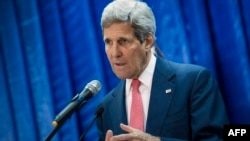U.S. President Barack Obama is set to unveil his plan for an expanded American military effort against Islamic State militants in the Mideast.
Obama is giving a prime time television address Wednesday night to describe the threat of the insurgents to U.S. national security and how he plans to combat it, possibly by expanding American airstrikes against militant strongholds in Iraq to Syria.
Obama has told key government officials that he believes he has the authority to order an increased military offensive without congressional approval. But he told four top lawmakers at a White House meeting Tuesday that he would welcome a favorable legislative vote to show the country was united in fighting the militants.
The president also plans to renew his call to arm and train Syrian rebels fighting the Islamic State militants and trying to overthrow Syrian President Bashar al-Assad.
In Baghdad, Secretary of State John Kerry said he was encouraged by new Iraqi Prime Minister Haider al-Abadi's naming of a new inclusive government and Iraq's help in fighting the Islamic State.
Kerry met with Abadi at the start of a week-long trip in the region. He is seeking new support for the campaign against militants he described as "the manifestation of evil."
The top U.S. diplomat said nearly 40 countries are already contributing military and humanitarian aid in the fight against the insurgents and to help people trapped by their advance across northwestern Iraq and eastern Syria. France said Wednesday it would join airstrikes in Iraq "if necessary."
The secretary of state said he was optimistic that the new Iraqi government could unite the country. Abadi's predecessor, Nouri al-Maliki, was blamed for marginalizing Iraq's Sunni minority and helping give rise to extremists.
Hours after Kerry began his visit to Baghdad, Iraqi officials said at least two car bombs exploded in an eastern part of the capital, killing at least 19 people in Iraq's latest unrest.
A White House official said Wednesday the president's plan includes "U.S. military action and support for the forces combating ISIL on the ground - both the opposition in Syria and a new, inclusive Iraqi government."
Officials have given few specifics on what Obama plans to say in the White House address. The president has already ruled out sending U.S. ground forces back into Iraq.
The United States has carried out 154 airstrikes on Islamic State targets inside Iraq, and U.S. officials have discussed the possibility of expanding that campaign.
Possible strikes in Syria
The New York Times late Tuesday quoted a senior administration official as saying President Obama is prepared to authorize airstrikes in Syria. But the paper reported Obama is trying to figure out how to do so without helping the Assad regime. Several foreign policy experts briefed by Obama this week also told The Washington Post that the president is ready to use U.S. airstrikes on both sides of the Syria-Iraq border in order to protect U.S. national security.
Before leaving on his Mideast trip, Kerry said the U.S. is trying to form a broad global coalition to "confront, degrade and ultimately defeat" the group.
Kerry says nearly every nation on Earth has a role in wiping out the Islamic State, including taking up arms, sending humanitarian aid to Islamic State's victims, and working to cut off funds to the group.
He said other assistance will involve cutting off militant funding, preventing the flow of foreign fighters and counteracting propaganda.
Those efforts will likely be the focus of Kerry's talks Wednesday in Jordan as well as a meeting of regional foreign ministers in Saudi Arabia on Thursday.
From Jeddah, Kerry will head to Paris, where officials say he will consult with "key partners and allies on how to further support the security and stability of the Iraqi government."
Syria
Obama came close to direct military action a year ago in Syria to support what Washington considers more moderate rebel forces fighting President Bashar al-Assad, but held off given strong opposition in Congress. After disgust in America over the videotaped beheading of two American journalists by Islamic State in the past month, resistance in Congress has diminished.
But Washington's failure since then to support the moderate groups has left them weakened and it is unclear how the United States can build up such forces quickly enough to create a useful military ally on the ground.
Obama has shown a willingness to intrude militarily into Syrian space with an unsuccessful operation in July to try to rescue Americans held hostage by Islamic State, and he said in an interview that aired on Sunday that Washington was prepared to hit the group's leaders wherever it could.
Iraq
Iraq's formation of a relatively inclusive government on Monday has cleared the way for wider U.S. action in support of Iraqi armed forces and Kurdish forces in a country where the United States was engaged in a bitter military struggle for nine years after overthrowing President Saddam Hussein.
Kerry arrived in Baghdad on Wednesday to meet with Iraqi leaders and discuss efforts to combat Islamic State.
Earlier Wednesday, Obama authorized $25 million to the Pentagon to help train and provide immediate military assistance to the Iraqi government and the Kurds.
Polls this week show the majority of Americans support action against the militants.
Some material for this report provided by Reuters.
Editor's note: VOA will provide live online analysis and coverage of President Barack Obama's Wednesday night address to the nation. Coverage begins at 8:30 p.m. EDT, followed immediately by the president's speech. Just go to voanews.com.






